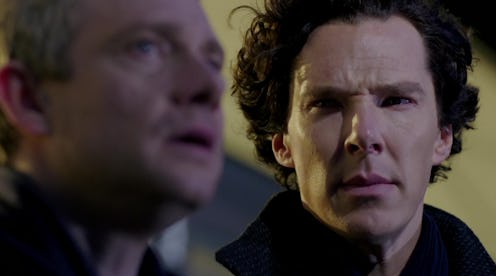Entertainment
The Truth About 'Sherlock's Mary Morstan

John Watson is an addict. No, it's not in the literal sense that Sherlock Holmes has relied on narcotics throughout his existence in canon and countless adaptations — it is, rather, an addiction that many who find themselves the center of high-tension long-form stories find themselves falling into; one long suffered by heroes in stories. John Watson is addicted to dangerous people.
Sherlock's third season came to an end tonight, with "His Last Vow" serving as the last hurrah of the sadly brief reunion with the world that this season of Sherlock felt like. Hopefully this time it won't take two years to get a fourth season. Until then, we've got to take what we can get, and what we've got with this episode is, among other things, a backstory for Mary Morstan.
I should state at this point that, when it comes to this episode of Sherlock, I am very much still making up my mind. What did I think about it? I genuinely have very little idea. I know that going into it I expected something wholly different from what I got, and yet what I got was... simultaneously relatively unsurprising?
Mary Morstan is, of course, not the normal nurse she might have seemed to be. We find this out when she shoots Sherlock in the gut, which is, you know, startling and horrible but also weirdly OK when you get down to the brass knuckles of it. Because Mary Morstan isn't just a nurse, she's a retired spylady.
The exact background of Mary Morstan is honestly not what I'm interested in. What I'm interested in is much more rooted in the catalyst that this background provides for a shaking up of the dynamics this show. Because John and Sherlock work, and John and Sherlock and Mary work — but what happens when John Watson finds out that the woman he just married is every bit as messed up and deceitful as the best friend who faked his death and abandoned him for two years?
The answer: We get some truly tension-filled scenes followed by a third act of truly sweet ones. These are all interspersed with an exploration of Sherlock's most gloriously disgusting villain to date, Charles Augustus Magnussen. Magnussen plays against every reserved British sensibility. In fact, he flicks John Watson in the face in a climactic scene, and it's oh-so-different from the manically maniacal high tension of the past two seasons of Moriarty.
Whereas last season's finale saw Sherlock apparently sacrificing himself for the safety of those he loved, this time... well, this time he did pretty much the same thing, but it was open and honest and straight-forward in a way that only this season's Sherlock could be in his newfound commitment to never hurt John Watson again.
Who knows what next season's Sherlock will bring — Baby Girl Watson, bundled to Sherlock's chest as he looks at his crime wall and makes deductions? Moriarty's network resurfaced and wreaking havoc anew?
Who knows, and who knows when we'll get it. What we do know is this: This is a Sherlock Holmes the world's still getting used to. This is a John Watson ensconced in a domestic situation that's already lasting longer than initially predicted. This is the return of the presence (if not physically, then mentally) of the series' most notorious villain.
This could go anywhere.
Image: PBS/BBC